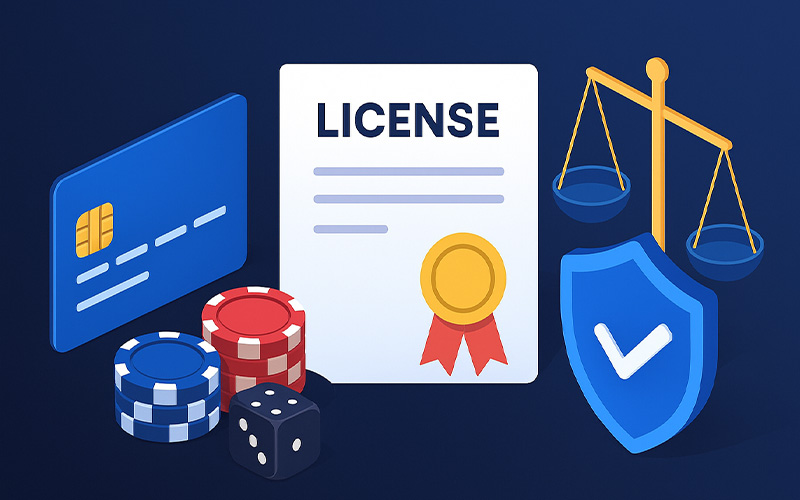
As of October 1st, 2025, a new Gambling Act has been in effect in Gibraltar, strengthening oversight and expanding licensing requirements. The changes affect operators, B2B companies, and service agencies, making them establish a physical presence and maintain a higher level of compliance.
Overview
- New Gambling Act effective from October 1, 2025
- Expands licensing rules for operators, B2B firms, and service providers
- Requires physical presence, local staff, and stronger compliance
Context
Core Requirements
- Economic presence: companies must open offices, employ locals, and pay taxes
- Expanded licensing: separate permits for B2C, B2B, and support services (CRM, marketing, hosting, trading)
- Approved Persons: C-level executives require accreditation and personal responsibility
- Advertising oversight: all promotional activity in or from Gibraltar is now regulated
- Stronger powers: the Gambling Commissioner can issue fines, suspend licences, and order inspections
Gambling Appeals Tribunal
Transition Period
- 6 months for adaptation and reapplication
- Old licences remain valid temporarily
- Companies must resubmit documentation and align processes
Market Impact
- 3 200+ employees, 54 operators, ~20% of GDP
- Contributes £110M in corporate taxes and £40M in PAYE fees
- Reform strengthens Gibraltar’s image vs. Malta and the Isle of Man
Key Takeaways
Casino Market experts have thoroughly examined the details of the law and prepared a comprehensive review to help niche businesses safely adapt to the new rules.
Context and Objectives of the Initiative
Gibraltar has maintained its status as one of the most reputable oversight centres for online gaming for many years.
The following benefits have helped the jurisdiction capture the attention of leading international brands:
- affordable corporate tax;
- balanced regulatory approach;
- favourable geographic location, etc.
After Brexit, the peninsula lost the ability to license its products to European markets, so the focus shifted to strengthening its reputation and permits’ pragmatic value. The newly adopted Gambling Act is a response to these challenges. It replaces the 2005 law and reflects the industry’s modern realities, where compliance, transparency, and economic sustainability are increasingly emphasised.
The goal of the reforms is to cement the jurisdiction’s status as a hub with a high level of trust and clear rules for all market participants.
Better Change’s CEO claimed that the shift represents a meaningful and consistent step forward. According to Victoria Reed’s statement, long before the initiative, Gibraltar had struck a good balance between commercial interests and strict oversight, making it a reliable base for the largest British gaming brands.
After Brexit, this equilibrium has become crucial. The territory can no longer issue licences throughout Europe, so it is now focusing on access to the UK market and raising its regulatory standards.
The reform is aimed precisely at:
- expanding the scope of control;
- strengthening supervision at all stages of companies’ work;
- enshrining the requirement for businesses to have a real presence in the jurisdiction.
Gambling Act 2025: Central Specifications
The new legislation changes the approach to sphere oversight on the peninsula and introduces additional demands. For B2C platforms, B2B providers, and service agencies, this peculiarity entails reviewing corporate structures, compliance procedures, and risk management protocols.
Let us look at the key points of the new provisions:
- Verified economic presence. Permit holders must run projects within the jurisdiction by establishing an office, hiring citizens, setting up the necessary infrastructure, and paying local taxes. The goal is to eliminate formal, abandoned companies that provide no benefit to the government.
- Expanded licensing. The law introduces separate certifications for B2C, B2B, and operator support services, such as marketing, CRM, managed trading, software hosting, and others, each now requiring a unique document.
- Approved Persons. Accreditation of top representatives is introduced. C-level executives must undergo due diligence and obtain a permit, similar to the Personal Management Licence in the UK. This change increases accountability at the individual level.
- Advertising control. All promotion activities conducted in or from the territory are now subject to legal supervision. The pool encompasses affiliates, large marketing groups, and creative agencies.
- More regulatory powers. The Gambling Commissioner has been given the authority to impose administrative fines, suspend certifications, issue orders, and run inspections. These measures strengthen oversight and improve discipline.
- Digitalisation and communication. The law introduces stricter online reporting requirements, including AML, financial disclosures, adherence to technical standards, and product safety initiatives.
With this transformation, the jurisdiction enhances transparency, increases business responsibility, and provides greater assurances of trust for industry representatives and the regulator.
Gambling Appeals Tribunal’s Significance
One of the key changes in the law is the establishment of an independent body that reviews submissions against the Commissioner’s decisions. The new judgment authority has the right to refuse permit applications, suspend or revoke licences, and take other enforcement measures if necessary.
The Tribunal’s creation aims to enhance confidence in the legal system, making it more transparent and predictable. This move provides operators with additional protection for their interests, and the regulator with a tool for the fair and balanced implementation of rules.
For businesses, this innovation means:
- increased trust among partners and investors;
- a more foreseeable environment for strategy and funding planning;
- the ability to challenge the highest authority’s decisions in an independent format.
The introduction of the new body brings the framework closer to international best practices.
Reforms’ Effect on Industry Participants
The shift directly changes the rules for all market players. B2C and B2B companies must carefully review their group structures to understand which divisions require licensing. For large international corporations, this transformation may involve multiple separate applications and a reorganisation of internal management.
Particular attention is being paid to top executives. The Approved Persons model places individual accountability on them. Now, C-levels are responsible not only for the firm’s operations but also for ensuring adherence to all relevant legal norms.
The following service departments are subject to regulation:
- promotion;
- technology;
- CRM, and others.
Each of them may need a separate certification, which increases the administrative burden but simultaneously enhances transparency and trust in the business. Compliance with established rules is not just a formality: it presents an opportunity to strengthen reputation, mitigate the risk of claims, and maintain stable access to the UK market.
Our team provides a detailed analysis of which branches and processes require licensing, along with recommendations for adapting the project structure to meet the new norms.
Transition Period: What Operators Can Expect

Companies have a half-year transition period starting from the date the law came into force. During this time, existing permits are converted to the new regime, which leads to resubmitting applications and bringing all activities into compliance with the reform’s terms.
For operators, this news means increased costs for adherence, auditing, and hiring local personnel. Small studios or those accustomed to working with a minimal structure may face an additional burden. If the shift attracts more players to the market, demand for qualified employees in Gibraltar is likely to increase.
The anticipated agreement between the UK and the EU mitigates the situation. It can simplify the entry of workers from Spain and reduce staff risks for companies.
The transition period should be used as effectively as possible to:
- prepare licensing documents;
- review the business structure;
- establish digital reporting processes, etc.
These measures will help brands avoid disruptions and save resources while fully adapting to the new standards.
Uncertainty in the Introduced Rules
While the law strengthens transparency and oversight, some aspects remain unclear. In particular, experts note issues with the accreditation of marketing and service arms. The government states that a separate permit is required for activities on and from the peninsula. Nevertheless, exceptions may be possible for intra-group operations.
It is difficult to understand which departments fall under the support category. The list includes random number generators, managed trading, hosting, and advertising, but uncertainty remains. For instance, whether multidisciplinary teams working across several branches must obtain a separate document is still unclear.
Concerns regarding the distinction between B2B and B2C also remain. For hybrid or cross-border business models, it is essential to determine whether additional permits are needed or if a single licence is sufficient.
Our team advises closely monitoring secondary amendments and precedents to ensure a prompt adaptation of structures and processes. We provide a detailed analysis of complex issues and step-by-step recommendations to prepare projects for the new requirements.
Gibraltar’s International Competitiveness
The iGaming vertical remains a vital element of the jurisdiction’s economy. Currently, this segment:
- employs over 3,200 people;
- support the services of 54 operators;
- accounts for around 20% of the peninsula’s GDP.
In 2024, niche enterprises contributed £110 million in corporate taxes and £40 million in PAYE fees. The territory hosts 83 permit holders: 49 B2C studios and 34 B2B firms.
Internationally, the territory competes with both well-established and emerging offshore centres. Unlike Malta, which has flexible norms, or the Isle of Man with its rigid structure, Gibraltar maintains a balance. Its system is focused on risk management while still allowing the regulator sufficient freedom and practicality.
Niche brands are expected to respect local standards in other countries and obtain any necessary permits. This approach is enshrined in the newly implemented Act.
Development Prospects and Industry Response
Market players perceive the 2025 document’s entry into force as a step toward building trust and increasing transparency. The sphere is currently adapting to the latest innovations. Still, it is already clear that operators are showing greater interest in the Gibraltar gambling licence, especially in the post-Brexit competitive environment.
The introduced rules will help maintain top standards and mitigate risks. Nevertheless, businesses face additional costs for licensing, compliance, and hiring local staff. For B2B providers and service teams, it is crucial to apply for certifications correctly and adhere to all the established demands.
Enterprises that quickly optimise internal processes and prepare inner structures for the new conditions will capitalise on a stable and regulated market, getting ahead of the competition.
The Main Things About Gibraltar’s Latest Legal Changes

The reform creates new supervision standards for wagering platform owners and software providers. It also reflects the industry’s modern realities and cements the territory’s status as a reliable jurisdiction.
Let us list key points from this review:
- Companies must now have a physical presence on the peninsula, including offices, full-time residential employees, and payment of local taxes.
- Separate licences are being introduced for different types of activities, including B2C, B2B, and service divisions, such as marketing, CRM, and technology arms.
- Company executives are personally liable under the Approved Persons regime, which enhances oversight at the individual level.
- All marketing activities conducted in or from the jurisdiction are subject to the regulator’s oversight.
- The Gambling Commissioner has been granted expanded powers, including the capability to impose fines, suspend certification, and initiate inspections.
- An independent tribunal has been established to review appeals against the highest industry authority’s decisions and strengthen trust in the system.
- Existing permits are temporarily valid during the transition period. Firms must submit new applications and bring their processes into compliance with the law.
Despite some classification issues and competition from other jurisdictions, the peninsula remains a stable and reliable hub for iGaming. The combination of flexibility and strict standards builds trust with international partners.
Our specialists can help you prepare your business for certifying in Gibraltar, develop a compliance strategy, and launch a turnkey project in accordance with the new rules.
Feel free to contact us for expert advice and personalised products. We offer modern payment solutions, advanced marketing tools, and other gambling software from trusted suppliers.
Have questions or want to order services?
Contact our consultants:
- e-mail: manager@casino-market.com
- feedback form.
Check the information used to contact us carefully. It is necessary for your safety.
Fraudsters can use contacts that look like ours to scam customers. Therefore, we ask you to enter only the addresses that are indicated on our official website.
Be careful! Our team is not responsible for the activities of persons using similar contact details.




























